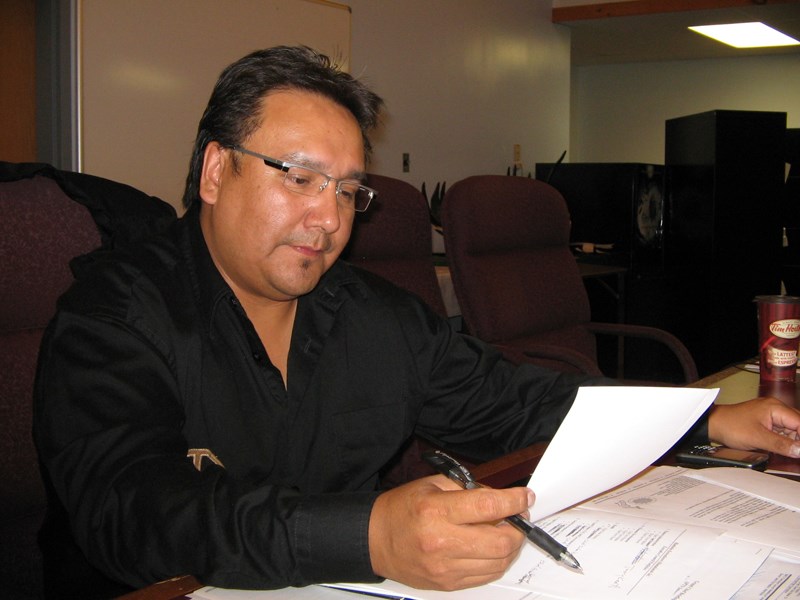David Harper, newly elected Grand Chief for Manitoba Keewatinowi Okimakanak (MKO), is calling for the immediate resignations of Jim Wolfe, regional director with the First Nations and Inuit Health Branch, and Pam Smith, the First Nations and Inuit Health Branch director for Manitoba, after Health Canada sent dozens of body bags to aboriginal communities in Northern Manitoba that have been hit hard by H1N1 influenza.
Harper says that MKO and other groups have been lobbying for proper health institutions and equipment on Northern reserves for a long time, and finds the shipment of body bags completely unacceptable.
"I feel for the people, especially for the elderly in our community and the young men and women, because they're the ones being insulted here," he says. "Young people are just devastated by these actions, but I'm very happy that our young men and women are speaking out, saying that we will prevail, and we're going to stand up and get through this storm that is about to approach us."
Although Health Minister Leona Aglukkaq said at a flu briefing in Ottawa on Sept. 16 that she has ordered her deputy minister to conduct an immediate inquiry into the situation, Harper says that is not good enough, and adds that he is waiting for an apology from Aglukkaq herself.
"The sole person to act and to apologize on behalf of her department would be the minister. She's the sole person that is responsible for the actions of her department, and she has to be liable and willing to act on behalf of Health Canada to apologize to the First Nations people of Northern Manitoba, especially Wasagamack First Nation and Gods River First Nation."
Harper goes on to say that body bags are not a solution to dealing with H1N1 on Northern reserves - instead, he is calling for more H1N1 flu kits and Tamiflu to be immediately available on reserves. He also adds that this issue stems from the way the government of Canada has treated aboriginal health issues for its entire history.
"This is not just a Conservative issue, this is a Canadian issue. The Conservatives, even the Liberals, have been in government for a long time, and the state of health care that we're in, with nursing stations and fly-in doctors, that's irresponsible. If that's the Canadian right to health, we don't want it," he said. "Right now the way we look at it, the treaty right to health is being denied, the Canadian right to health is being denied and even the human right to health is being denied. If we had proper measures taken for the betterment of our First Nations, there would be doctors in our communities; there would be proper facilities in our communities. But to have clusters of hospitals and doctors in urban areas doesn't meet the criteria."
Harper is not the only one demanding an apology from Aglukkaq - many MPs are saying that the shipment of body bags that were sent along with hand sanitizers and face masks is inexcusable.
Liberal leader Michael Ignatieff has been in touch with Harper and is also calling for an apology from Aglukkaq. He says the body bags are a message that Ottawa is not expecting aboriginal communities to deal well with H1N1 this fall.
"It simply says: 'We expect aboriginal Canadians to die," he said to reporters outside of the House of Commons on Sept. 17.
"This is a callous act proving that the federal government doesn't get it," said Niki Ashton, NDP MP for Churchill, the riding in which the Island Lakes region is located. "After months of pushing for real action, are First Nations to understand that the federal government's plan is to wait for people to die?"
Aglukkaq herself has said that anyone suggesting that Ottawa's answer to H1N1 in Northern reserves is to send out body bags is "sensationalizing the situation." She met with Chuck Strahl, minister of Indian Affairs and Northern Development (INAC) and Shawn Atleo, national chief of the Assembly of First Nations (AFN) on Sept. 19 to sign a communications protocol to affirm their commitment to work on pandemic planning efforts.
At the signing Strahl said that the government is coordinating its efforts with other federal agencies and the AFN to prepare for and respond to pandemics like H1N1 influenza in First Nation communities.
Atleo says the communications protocol, called Working Together on H1N1 Preparedness, is an important step in improving communications and having direct involvement in the pandemic planning for First Nation communities.
"First Nations communities will now have stronger communications options which will also ensure communication at the highest levels as issues arise in the course of planning and response, plus a forum to raise concerns," he explains.
The Government of Canada is hosting a virtual summit along with the AFN specific to H1N1 in First Nation communities. The parties present at the singing also reviewed a joint action plan between Health Canada and INAC that outlines how the two federal departments are working together to ensure on-reserve First Nation communities are well prepared to respond to H1N1 and pandemic issues.




